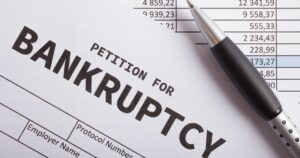Filing for bankruptcy may stop repossession. But it depends on the type of bankruptcy you file and how far into the repossession you are. If you are being threatened with repossession and you want to keep your vehicle, speak with a bankruptcy attorney immediately.
The sooner you file for bankruptcy, the easier it might be to save your car from repossession. While you wait for your bankruptcy consultation, read on to see what types of bankruptcy can save your car and at what point you can no longer stop a repossession.
What Is a Repossession?
When you fall behind on your auto payments, you have defaulted on the loan. Once in default, a lender has the right to repossess, meaning take the vehicle from you, so that they can sell it at auction and use the funds to recover some of their losses.
One common misconception is that, if your vehicle is repossessed, you no longer owe on that loan. This is untrue. The lender can still hold you accountable for any fees and remaining balance after they sell the vehicle and pay the balance with the proceeds – which means you could have a car payment on a vehicle you no longer own.
The Automatic Stay Can Help Stop a Lender from Repossessing
When you file for bankruptcy, you get an automatic stay. The automatic stay requires all creditors to cease collection activities against you. That means they cannot contact you for payments, harass you, file liens, repossess a vehicle, or even foreclose on your home. You must file for bankruptcy to get the automatic stay, which is why it is critical to file as soon as possible if you want to avoid repossession.
How Chapter 13 Works for Vehicle Repossessions
Chapter 13 bankruptcy is a common consumer bankruptcy option. Under Chapter 13, you propose a repayment plan to the court, and once it is approved, you will make those payments in the amount and on the schedule specified in your repayment plan.
You can include your vehicle if you wish to keep it.
How Chapter 13 Works If the Car Has Not Been Repossessed
Chapter 13 will prevent a repossession if you get the automatic stay before the lender has time to repossess the vehicle. If your repayment plan includes paying any outstanding payments on your car, then you will be able to keep that vehicle. However, you cannot keep the car if you do not plan to pay outstanding payments on the car; instead, you must surrender it to the lender. So, if you want to keep your vehicle, you must be prepared to catch up on outstanding payments and include them in your repayment plan.
You Must Still Make Payments, Too
While you are waiting for your payment plan to get approved, you must still try to repay the loan – even if it is just half of the monthly payment. This prevents you from getting further behind but shows the court that you plan to repay the loan and have good intentions.
Chapter 13 May Reverse a Repossession
If your vehicle has already been repossessed, you may be able to get it back after you file for Chapter 13. However, you must act quickly. The lender moves fast after they repossess the vehicle to sell it and recover their losses. Once the vehicle is sold, you cannot get it back.
So, if your vehicle was already repossessed, speak with a bankruptcy attorney immediately to see what your options are.
How Chapter 7 Can Help Prevent a Repossession
Chapter 7 is not a repayment plan but, instead, a full discharge of your debts. When you file for Chapter 7, you still receive your automatic stay. However, without a court-approved repayment plan, you must find a way to get current on your auto loan so that you may keep the vehicle.
Most courts will let the lender proceed with repossession when you are filing for Chapter 7. This is because you do not have a court-approved repayment plan in place to make the loan current, and the lender has no reassurance you will pay the loan back. One option, however, is to use some of the following techniques:
- Buy the vehicle back from the lender in a redemption process. You can purchase the car back from the lender in a single payment, and you will redeem it equal to its replacement value rather than market value.
- Reaffirm your payments and loan. You can agree to new payment terms, payment amount, and interest. The outstanding payments are then rolled into a new loan, and you resume making on-time payments from there on out.
How Lenders Can Still Repossess Even with an Automatic Stay
Whether you filed for chapter 7 or chapter 13, lenders can still repossess your vehicle. However, to do so, they must petition the court to have the stay lifted. That means there will be a hearing, and you and your attorney can argue why the stay should remain in place. One way to prove you deserve the stay is to show that you have attempted to make protection payments on the vehicle, even while filing for bankruptcy.
If you have not made any payments on the vehicle, then it will be harder to get a judge to deny the lift.
Speak with an Attorney to Prevent Your Vehicle from Being Repossessed by the Lender
If you are facing repossession but you would like to keep your car, the best thing you can do is speak with an attorney immediately. The sooner you file for bankruptcy, the sooner you can unlock the protection of the automatic stay – which may be all that stands between you and losing your vehicle.
You will want to consult with an attorney to see which type of bankruptcy is right for you and which makes it more likely you can keep your vehicle. To get started, contact the bankruptcy team at Gravis Law today.
We offer confidential consultations, so call our office and schedule a case evaluation or contact us online to get started.

